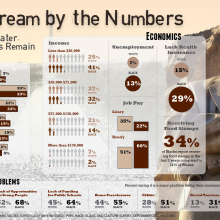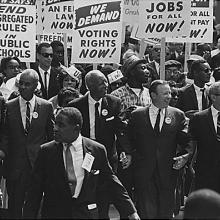racial inequality
In one America, an insurrectionist is granted permission by a judge to take a trip to Mexico with charges pending. In the other America, the National Guard is deployed in response to Black Lives Matter protesters organizing at the Lincoln Memorial. One group’s humanity is seen and validated, while the other group’s humanity is ignored and questioned.
In the 2016 season, many players followed in the footsteps of San Francisco 49ers quarterback Colin Kaepernick, who began kneeling during the national anthem as a form of protest against police brutality and racial inequality sparking a national debate.
GENTRIFICATION DOESN'T look the same everywhere, but it is happening in most major cities in the U.S. And this isn’t just about the brewpubs, the coffee shops, or even the “cash for houses” signs. As Peter Moskowitz writes in his book How to Kill a City: “Gentrification is the most transformative urban phenomenon of the last half century, yet we talk about it nearly always on the level of minutiae.”
The underlying connection is the economic reality: “Gentrification is a system that places the needs of capital (both in terms of a city budget and in terms of real estate profits) above the needs of the people,” Moskowitz writes. This came up often as I talked with people involved in the complex world of housing and development.
Christian theology offers compelling reasons why individuals and communities can and must care about this dynamic. At the core of Christianity is the call toward love of neighbor. When the poorest of your neighbors continually face the brunt of a system designed not to care about them, gentrification becomes a church issue.
I WAS ONCE told that “racism is our nation’s original sin.” This statement jolted me. While I didn’t dispute its truth, I have come to realize racism is much more complex than this.
In order to dismantle the structural sin of racism, we have to first set it within a larger context that acknowledges racism’s sociopolitical dependency and structural interconnectedness.
First: “race” is not real. It is not a scientific category; biologically, it does not exist. Race is a social construct, something built systematically. It has no inherent value or true significance beyond what we give it. In order for race to have real social consequences—which it undoubtedly does—there must be other phenomena at work that validate, sustain, and reinforce the social significance of race.
As a result of sin in our fallen world, human bodies are appraised and given a value based upon certain criteria. As a result of sin, men are privileged over women, white skin is privileged over darker skin, able bodies are privileged over disabled bodies. Historically, certain bodies are acclaimed while others are defamed. Race plays a starring role in this larger drama of embodiment.
IN JUNE 1966, Sen. Robert Kennedy joined the National Union of South African Students for a conference held in Cape Town. Tension was running high. NUSAS president Ian Robertson had been banned under the Suppression of Communism Act, and the pressure was on Kennedy, from both the apartheid government and sectors of the anti-apartheid movement, not to attend.
Kennedy went anyway and delivered one of the best speeches of his career. “Few have the greatness to bend history itself,” Kennedy reminded the students. “But each time a [person] stands up for an ideal, or acts to improve the lot of others, or strikes out against injustice, [s/he] sends forth a tiny ripple of hope ... daring those ripples to build a current which can sweep down the mightiest walls of oppression and resistance.”
Twenty-eight years later Nelson Mandela became the first democratically elected president of South Africa. The West embraced him, celebrating his magnanimity, “disremembering” the support it gave to the very apartheid regime Mandela worked to dismantle.
Yesterday’s “Let Freedom Ring” ceremony in Washington, D.C., honored the nation's substantial advances in racial equality in the fifty years since Dr. Martin Luther King, Jr. delivered his now-iconic “I Have a Dream” speech.
But events this year — from the Supreme Court gutting the Voting Rights Act to the House eliminating funding for food stamps to the Trayvon Martin trial — are posing serious challenges to our national progress towards true equality for all.
An infographic from the Public Religion Research Institute, "The Dream by the Numbers," highlights systemic inequalities that still work against communities of color today. The statistics are grim: black communities are unemployed at nearly double the rate of white communities. Fewer than 20 percent of black youth will receive a college or graduate degree. Twice as many blacks lack health insurance as whites. And nearly 70 percent of blacks surveyed mentioned “lack of opportunities for young people” as a top concern for their community.
I will march on Saturday because I refuse to allow my two sons to be treated as statistics or a stereotypes rather than as children of God. I will march because overly aggressive policing tactics that overly rely upon racial profiling make a mockery of Dr. King’s dream that every child will be judged by the content of their character and not the color of their skin.
I will march because the recent repeal of section four of the Voting Rights Act by the Supreme Court jeopardizes the voting rights of millions of Americans across the country, particularly in southern states where new barriers to this sacred right are already being erected.
I will march because based on national statistics, my two black boys face a one in three chance of spending some time of their lives behind bars, a disturbing and destructive reality that has been made possible in part by mandatory drug sentencing laws that must be reevaluated and changed.
Recent studies from both the Urban Institute and the Pew Forum tell the story of America's growing racial wealth gap. In the May issue of Sojourners magazine, Otis Moss III talked about the unjust trend:
The call of the church has been, and always will be, to become the compassionate hands and feet of Christ. Poverty, when attached to race, is the original sin of America, a country built by slave labor and enriched by the unfair labor practices of the Industrial Revolution.
Read the full piece HERE.

See the full infographic at the jump.





